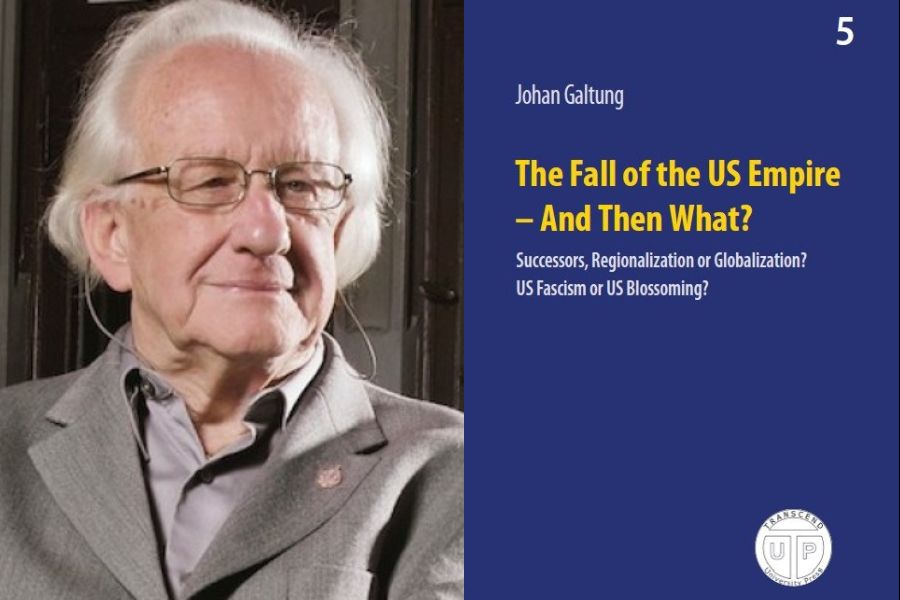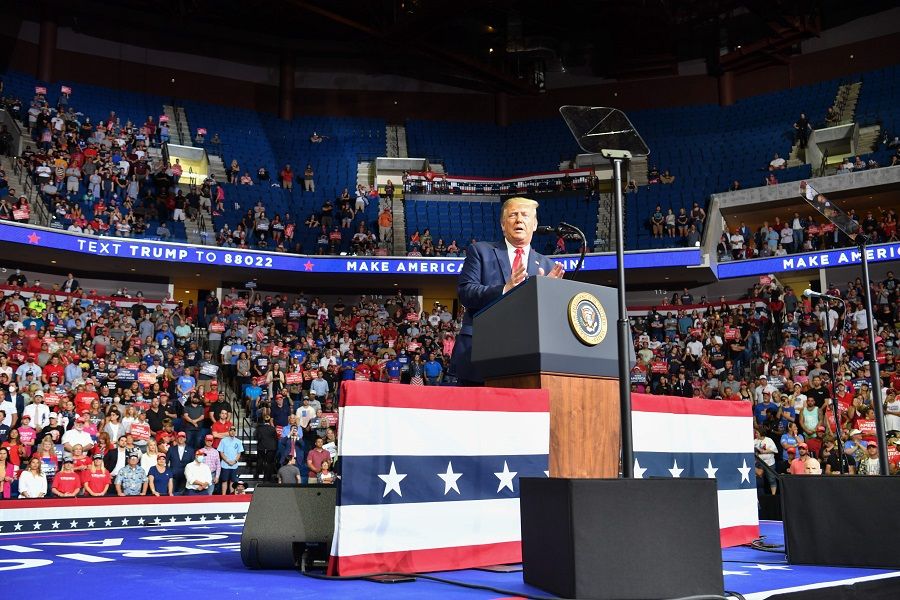The US empire will not fall anytime soon, going by ancient China's experience

Norwegian academic and "Father of Peace Studies" Johan Galtung published The Fall of the US Empire - And Then What? in 2009. Predicting the fall of the US empire in 2020, that is, the fall of the US as an empire and not the collapse of the country, the book caused a sensation at that time.
With the earlier half of 2020 coming to an end, it is now time to re-evaluate Galtung's prediction. This is not only a reassessment of his prediction, but a glimpse into the future state of international politics.
Questioning Galtung
Amid the commotion, I wrote an article titled "Galtung and the US Empire: Who is the Winner" (加尔通与美帝国:谁是赢家) in Dushu (《读书》) magazine in 2014, in which I disagreed with Galtung's prediction on the basis that his conclusion was invalid even if all of the US's problems that he had listed were valid. This was because of two major flaws in his prediction.

First, his methodology lacked a horizontal analysis for comparison. Galtung asserted that the 15 contradictions faced by the US were much worse than the six contradictions faced by the Soviet Union.
Based on the US's vertical trajectory alone, there is nothing wrong with Galtung's discussion and judgement. However, in a competitive system, the role, function, status, and destiny of a single unit is not determined by the unit alone - other units have to be taken into consideration as well. Those factors are ultimately dependent on the unit's horizontal competitive relationship with other units, which is the sole criterion that determines their destinies.
In other words, the unit's own vertical development only affects - but does not determine - its destiny within the system. For example, even if a unit is improving, its relative role, function, status, and destiny could instead be worsening if its competing unit becomes even more powerful than itself.
This logic does not only apply to international competition but to any type of competition, including those faced in our daily lives. Thus, the improvement or deterioration of the unit itself does not determine whether its horizontal standing within the system becomes better or worse. Hence, even if the US's vertical development worsens, this does not mean that the US empire will fall.
While there have been some changes in the relative strengths of major powers in the world, the US is still the world's top power and only superpower.
Second, in today's world, there is still no alternative that can fill the void if the US empire falls. That is, there is no other entity (country) capable of absorbing the aftershocks of the disorder expected after the fall of the US empire. While Galtung correctly predicted the fall of the Berlin Wall and the dissolution of the USSR, he failed to realise that these predictions are very different from his prediction about the fate of the US empire. This is because after the Berlin Wall had fallen and the USSR had dissolved, Galtung easily found an alternative that could absorb the disorder created by the two events in the US.

However, he would be hard-pressed to name a reliable alternative to tackle the world chaos expected following the fall of the US empire. The alternatives he provided in his book were weak and smacked of moralism. While he designed and described how the world would look after the fall of the US empire - including globalisation, global citizenship and global human rights - he described them in the context of how things should be, rather than an affirmative "it can be so" or that "it has the conditions to be so".
The US and China's respective strengths and weaknesses
Six years later, I maintain my doubts over Galtung's prediction and stand by my judgement that the US empire will not fall in 2020.
While there have been some changes in the relative strengths of major powers in the world (that is, the main units of the system), the US is still the world's top power and only superpower.
In recent years, there have been some changes between China and the US. Based on their vertical developments, China has made two major improvements. First, its GDP is rising and closing the gap with that of the US. Second, technological advancements are constantly being made, and a few low- to medium-technologies have entered the realm of high technology.
On the other hand, China also has some shortcomings. First, its GDP growth rate has significantly slowed. Second, it heavily depends on foreign countries for technology and has few original technologies of its own. The US has the greatest edge over China in this aspect, making it difficult for China to be on par with the US in the short term. Third, it is highly reliant on foreign countries for its energy sources and resources, and this dependence will continue to rise following China's increasing demand for energy.
The US has also seen a few positive vertical developments. First, its GDP growth rate has accelerated. Second, its labour market has improved. Third, it has achieved energy independence as a result of rapid improvements made in this area.

The US wins on economic strength and political stability
The vertical developments of China and the US have resulted in horizontal changes in the international system, namely with the US gaining two major advantages.
Firstly, a closing of the gap between the economic growth rates of China and the US. Although the US's GDP growth is slower than China's, with the US experiencing a rising growth rate and China experiencing a slowing one, the difference in growth rates has been greatly reduced from 12.35% in 2007 to 3.64% in 2018. Fundamental economic indicators show that in a vertical analysis, the economic prosperity of the US is increasing while that of China is decreasing. Seen horizontally, this increase on one side and decrease on the other is more beneficial to the US. China's economic downturn and the US's economic prosperity is a vital change that greatly affects the competitive relationship between both countries, especially since the US is the world's largest economy.
However, the US economy as a whole will recover and bounce back after the pandemic because of two major factors.
Secondly, a widening gap between the energy industries of both countries also translates into a bigger advantage for the US. The US's reliance on foreign energy resources has greatly reduced since it began its energy exports. Yet, China is still heavily reliant on foreign countries for its energy demands and is not self-sufficient. While oil prices have fallen in recent years and dealt a great blow to the US's shale oil industry as a result, this is a commercial disadvantage and not a threat to its self-sufficiency. In other words, it does not pose a major strategic disadvantage to the US.

Like all countries, the US's economic growth and social stability are bound to be affected by the pandemic. As the pandemic hinders direct face-to-face interactions between people, the tertiary sector of the economy, which occupies a huge portion of the US economy, will even be more severely impacted.
However, the US economy as a whole will recover and bounce back after the pandemic because of two major factors. First, the differing levels of confidence that investors have in China and the US. The unpredictability of China's policies translates into high political and policy costs for investors. Chinese economy's cost advantage has also been greatly reduced in recent years and its tax system demands high standards in theory but is flexible in implementation, leaving much room for unwritten rules. On the other hand, while the question of political leadership in the US - that is, whether Trump would be re-elected - affects the country, its impact on the US economy is relatively limited.
That is to say, momentary fights and conflicts would not affect America's hegemonic status - at least not in the short term.
How might an empire fall?
So then, under what conditions might the US empire fall? Firstly, there has to be severe civil unrest in the US. Secondly, other major powers including the main allies of the US such as the UK, Germany, Japan, and France have to revolt against American hegemony.
Under the circumstances of a strong economy, the first condition is unlikely to happen. Trump's mishandling of the pandemic has worsened the US's already intense partisan politics. Such divisiveness has spread into American society and split it into two camps - the pro-Trumps and the anti-Trumps - such that social fragmentation could become inevitable. However, severe civil unrest in American society as a result of the presidential elections and pandemic is unlikely to occur. That is to say, momentary fights and conflicts would not affect America's hegemonic status - at least not in the short term.
The events that led to the weakening of ancient China's position in the East Asian system were not small-scale conflicts or war, but large-scale civil wars, along with the rise of alternative forces ready to replace it.

Ancient China provides a good reference to this point. The events that led to the weakening of ancient China's position in the East Asian system were not small-scale conflicts or war, but large-scale civil wars, along with the rise of alternative forces ready to replace it.
Large-scale civil wars in ancient China were mostly initiated by farmers in their protests against the government. These rebellions caused ancient China's position to weaken towards the end of the Han, Tang, Ming, and Qing dynasties. Towards the end of the Qing dynasty, the Taiping Heavenly Kingdom Movement dealt a greater blow, in fact, to the dynasty than the intrusion by Western forces. The Qing dynasty was especially unfortunate. Faced with two major blows - large-scale civil wars and the intrusion by Western forces - its international position was eroded. The military power of the Song dynasty before it had always been weak and it had never been in control of the East Asian system or the minorities of the North and the West.
Yet even then, wars alone were unable to dethrone ancient China from its dominant position in the East Asian region - a powerful replacement alternative had to be present as well. The political powers of the minorities around China had been on the rise towards the end of a few major dynasties, and these groups were waiting to usurp its position internationally.
In authoritarian countries where social oppression has long become the norm, things would turn very ugly once a problem occurs. This was the case with ancient China.
Returning to our discussion on the US, conflicts and fights in the country will not end because they are the part and parcel of a democratic system and manifestations of society's discontents. While large-scale civil wars could occur in democratic countries, the possibility is slimmer than in authoritarian countries. In authoritarian countries where social oppression has long become the norm, things would turn very ugly once a problem occurs. This was the case with ancient China.
Compared to a few years ago, we can say that the US is very unstable in 2020. However, can we imagine a large-scale civil war occurring in the US in 2020? A civil war may happen in the US in a remote future, but it would not be in the year 2020.

Coming to the second point, globally, although other major powers are dissatisfied with the US, there is no reason to openly, clearly, and strongly oppose American hegemony and lean towards other major powers because a replacement for the US empire is yet to be found.
Who rules the world?
The next in line to the throne, so to speak, after the US empire falls, should be one that is able to absorb the aftershocks of the resultant disorder and do a better job at maintaining world order than the US-led international order did - at the very least, it should not be worse than it. However, such a replacement is currently not in sight.
First, is American hegemony worse than Soviet hegemony? Second, is the US worse than other major powers?
Two reasons account for this void. First, no other country is as powerful as the US in being able to restore world order after the prevailing empire falls. Two, no country can replace the US in providing a legitimate alternative international order.
While the US no doubt exhibits hegemonic behaviour, as aforementioned, without comparison, there would be no differences and no advantages or disadvantages. Although the US is deserving of some criticism, some questions are worth considering as well. First, is American hegemony worse than Soviet hegemony? Second, is the US worse than other major powers? Third, if the US empire falls, who would maintain world order? Fourth, while many countries have complaints against the US, are they - and especially the major powers - willing to accept an international order that is more anarchic and lacks international public goods?

Mencius once said, "One who governs by force in the name of righteousness is a hegemon and a hegemon must have a large state as its basis (以力假仁者霸,霸必有大国)." Here, Mencius talks about the criteria of a hegemon. One, it has to be powerful and thus has to be a major power. This can be understood as having hard power. Two, it has to have a legitimate construct of values, rules, and order. This can be understood as having soft power, in a modern take on "righteousness". At present, is there a country that has surpassed the US in both hard and soft powers and can thus replace the current US-led world order? No, at least not for the moment.
Of course, no hegemon lasts forever. Using the horizontal methodology mentioned earlier, the US's role, function, status, and destiny amid international competition are not determined by itself. The US is indeed facing many problems. If its competitors are able to improve their overall might at a faster pace than the US through making reforms, the US's relative position would then decline.
At a certain critical point, if the US's competitors surpass the US internationally in terms of trustworthiness or soft power, the world's major powers would no longer trust or rely on the US. There would be no need to forcefully accept a US of little value then, which would be manifested in the abandonment of the US dollar. Then, the US empire would inevitably fall. However, this critical point would not occur in 2020. Neither would it appear in the next few years.
Thus, Galtung is doomed to fail in its 2020 showdown with the US empire.
